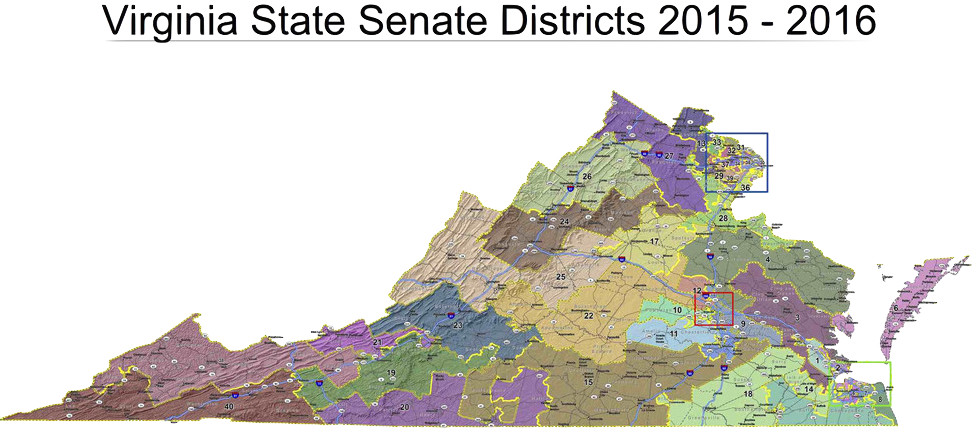|
Speak up!
 Citizens who attend public meeting to share their thoughts and opinions with their elected officials got a boost in April when Attorney General Mark Herring issued an opinion saying some policies limiting what can be said during public comment periods were unconstitutional. Specifically, the AG opinion (written at the request of Del. Rick Morris, R,) said the Franklin City School Board’s policy that prohibited citizens from speaking on specific personnel or student concern, using names or titles to identify individuals or engaging in personal attacks against employees or “other persons” violated principles of free speech. Citizens who attend public meeting to share their thoughts and opinions with their elected officials got a boost in April when Attorney General Mark Herring issued an opinion saying some policies limiting what can be said during public comment periods were unconstitutional. Specifically, the AG opinion (written at the request of Del. Rick Morris, R,) said the Franklin City School Board’s policy that prohibited citizens from speaking on specific personnel or student concern, using names or titles to identify individuals or engaging in personal attacks against employees or “other persons” violated principles of free speech.
Though the AG considers a public meeting to be a “limited public forum,” where government can impose some limits on speech, allowing discussion of individual school employees only during closed session — considering the exemption for personnel discussions is discretionary — “does not meet the constitutional standard of ‘leaving open ample channels of communication.’ ”
The opinion comes at a time when the FOIA Council is poised to review two bills referred to it by the 2016 General Assembly, both of which seek to mandate some sort of public comment period in FOIA.
Read the full opinion here
Open government in the news
Gov. Terry McAuliffe, D, signed a bill designed to undo the effects of last fall’s Virginia Supreme Court ruling that essentially negated the duty to redact documents. The signing of the bill in the same form it passed the House and Senate was notable since the governor originally tried to rewrite the bill to limit its application to just one exemption.
On the other hand, the General Assembly agreed to the governor’s amendments that will make the procurement of drugs to be used in implementing lethal injection anonymous. The bill says the drug compounding process is not the practice of pharmacy — so it won’t be regulated by the Board of Pharmacy — and the names of the drug suppliers will be confidential. The day before the vote during the legislature’s so-called veto session, the attorney general’s office issued an opinion confirming the constitutionality of the proposal.
A Surry County Circuit Court judge ruled in favor of the town of Claremont, its mayor and three other town officials in a FOIA case the judge and defense attorney called “trivial.” Claremont Town Council member Donna Skinner brought the suit last year after several skirmishes over access to record. The judge said Skinner “was overwhelming the town with FOIA requests.”
Responding to a complaint made by radio talk show host Rob Schilling, Albermarle County amended its website to clearly show that emails going to the local board of supervisors, city council and school boards were also being copied to various clerks, attorneys and managers.
After weeks of wrangling, a circuit court judge ruled that the Shenandoah County Sheriff’s Office had to allow the county school board to view a videotape of an incident on a sports school bus that led to seven students pleading guilty in juvenile court to charges of assault or battery by mob. The sheriff had resisted the school board’s request saying the tape was part of an ongoing criminal investigation and to protect the identity of the juveniles.
The Center for Public Integrity has asked the Virginia Supreme Court to make public auto title lending reports that show financial details such as how much interest the businesses charge on loans and how often they repossess cars. In March, the State Corporation Commission said it was unclear whether release of the reports would be considered “personal financial information,” which is typically confidential.
Instead of recognizing a variety of state and local government officials around the country in its annual Muzzle awards for actions taken to curtail free speech, the Thomas Jefferson Center for the Protection of Free Expression singled out just one “winner”: higher education. The center recognized a host of state and private colleges and universities in five categories: censorship of students, censorship by students, efforts to limit press access on campus, threats to academic freedom and censorship of outside speakers.
A judge in Winchester County ruled in favor of a Berryville resident against the town manager over records related to a request in 2009 seeking information about draining improvements on the volunteer fire and rescue company’s property.
Portsmouth City Council member Bill Moody has sued the city over the $1,500 fine his fellow council members imposed on him for posting on his Facebook page that a closed meeting had been called to discuss a local Confederate monument.
Plaintiffs in a FOIA suit against Pittsylvania County over irregular meeting procedures by a agriculture advisory board were surprised when they arrived at the courthouse for their April 20 hearing only to learn that the hearing had been continued until July 28 without their knowledge.
When reporters at the Virginian-Pilot asked school districts in their area to provide data related to current students and courses linked to state exams, most responded promptly and thoroughly. Not Norfolk, though, which claimed it could not retrieve at least four years of academic information from an old database. Chesapeake uses the same database but was able to provide the data. Unhappy with the Pilot story, the school superintendent called a press conference the next day to refute the story, claiming it contained misquotes or misrepresentations.
After Gov. McAuliffe announced he was restoring the voting rights of more than 200,000 former felons, a Daily Press reporter asked the Virginia Commissioner of Elections for a tally of the crimes the felons had served time for. The commissioner said there wasn’t such a list because the nature of the crime was irrelevant. The elections office cited an exemption for records about individuals maintained in the voter registration system even though the exemption applies only to registered voters and the ex-felons affected by the order have not yet registered.
The York County School Board met in closed session to discuss how it would proceed in filling a vacancy left by the death of a member. “As a general rule, they’re not supposed to discuss procedure” in closed session, said the FOIA Council’s Alan Gernhardt. The board’s attorney said they only discussed setting dates for interviews of people who had asked to be considered for the spot, which wasn’t a discussion of process, but simply “common sense.”
A Richmond judge ruled the Department of Education must release “Student Growth Percentile” data for Loudoun County because it had not proved that a FOIA exemption applied. The parent who requested the data said he will make it available to the public who can use it to draw their own conclusions.
Despite a request for the lawyer representing the family of Jamycheal Mitchell, the man who died in a jail cell while awaiting transfer to a state hospital, that officials preserve video of the area outside Mitchell’s cell, the Hampton Roads Regional Jail said in response to a FOIA request from the Richmond Times-Dispatch that the video no longer existed. An assistant superintendent of the jail said the tape was recorded over because “if there’s noting on the video that’s going to show any type of criminality or negligence, we’re not going to maintain it.”
The Virginian-Pilot found that the City of Portsmouth has destroyed at least 370 curbside trans cans’ worth of documents this fiscal year, but that no one knew what the documents were about. The city could not produce the forms that the Library of Virginia requires when documents are destroyed. The Pilot was able to secure hundreds of invoices to shred the records. |
